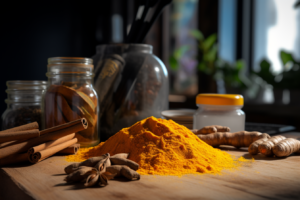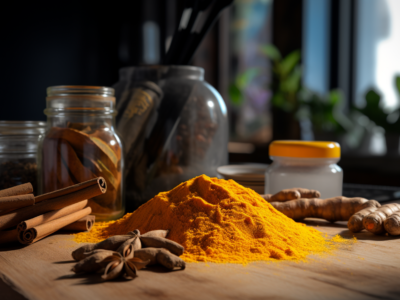Introduction to Interactions of Curcumin with Other Medications or Supplements
Turmeric, a medicinal herb, is known for its anti-inflammatory properties and is commonly used in alternative medicine. Curcumin, a compound found in turmeric, may be used to lower blood sugar levels, reduce inflammation, and treat arthritis. However, turmeric may interact with other medications or supplements, so it is important to talk to your healthcare provider before taking turmeric or curcumin. For example, turmeric may increase the risk of bleeding when taken with warfarin, aspirin, or other blood thinners. Additionally, turmeric may interfere with the action of diabetes medications, such as glyburide, and may reduce the effectiveness of drugs that reduce stomach acid, such as omeprazole. Taking curcumin supplements may also increase the risk of bleeding and bruising, so it is important to talk to your healthcare provider before taking curcumin supplements. Furthermore, turmeric may reduce the absorption of iron, so people with anemia should talk to their healthcare provider before taking turmeric. Finally, turmeric may interact with herbal supplements, such as Panax ginseng, fenugreek, and Javanese turmeric root, so it is important to learn more about turmeric and its possible interactions with other medications or supplements.
What is Curcumin?
What is Curcumin? Curcumin is a compound found in turmeric, a spice commonly used to flavor or color curry powders. It has been studied for its potential role in reducing inflammation and treating a variety of medical conditions. Curcumin may have anti-inflammatory, antioxidant, and anti-cancer effects. It is known to interact with certain medications, so it is important to talk to your health care provider before taking a turmeric supplement.

Curcumin is the main active ingredient in turmeric and is responsible for its many health benefits.
Studies have shown that curcumin may reduce inflammation, reduce blood clots, and reduce the effects of rheumatoid arthritis, type 2 diabetes, and bowel diseases. It may also reduce the production of stomach acid and iron absorption.
Curcumin may also have a role in reducing blood glucose levels. It is important to note that taking large amounts of turmeric or curcumin may cause serious side effects and should be avoided. It is also important to note that turmeric is likely to interact with certain medications, such as clopidogrel, coumadin, and sulfasalazine, and can cause low blood sugar. Therefore, it is important to talk to your health care provider before taking turmeric or curcumin supplements.
Interactions with Herbal Supplements
Interactions with Herbal Supplements are an important consideration when taking any type of supplement. Turmeric is a popular herbal supplement that is known to interact with other medications and supplements. Curcuminoids, the active compounds in turmeric, are known to interact with other medications and supplements. The role of curcumin in turmeric is to reduce inflammation and provide other health benefits. Turmeric is commonly used in traditional medicine and is known to interact with other medications and supplements.
It is important to be aware of the potential effects and side effects of turmeric supplement use. The Natural Medicines Comprehensive Database (NMCD) and the International Journal of Cancer (Int J Cancer) have reported that turmeric is safe for most people, but people with bleeding disorders should avoid taking turmeric at least 2 weeks before and after surgery. People with type 2 diabetes should also be aware of the potential effects of medications used in combination with turmeric. Pre-treatment with curcumin, a compound found in turmeric, has been found to reduce levels of blood sugar in people with type 2 diabetes. However, it is likely unsafe to use turmeric if you have a bleeding disorder, and you should stop using it at least 2 weeks before and after surgery. It is important to consult with your doctor before using any type of herbal supplement, and to follow the recommended doses of turmeric.
Interactions with Another Drug
Interactions with Another DrugWhen it comes to interactions with other drugs, turmeric and curcumin are known to interact with each other. Curcumin is a compound found in turmeric, and it is known to interact with turmeric in a way that can affect the action of curcumin. For example, curcumin can reduce the blood-thinning effects of certain drugs, so it is important to get medical advice before taking curcumin or turmeric if you are taking any other medications.
Turmeric is effective in treating inflammatory bowel disease, and it can also make it easier for the body to absorb certain drugs. However, it is important to be aware that turmeric can also increase the blood levels of certain drugs, so it is important to talk to your doctor before using turmeric if you are taking any other medications. In addition, it is important to be aware that some herbal supplements contain turmeric, and it can increase the risk of bleeding during and after surgery, so it is important to get medical advice before using any herbal supplements that contain turmeric.
Potential Benefits of Curcumin
Wow, curcumin is amazing! This compound found in turmeric has so many potential benefits. It’s no wonder that it’s been used for centuries in traditional medicine. For starters, curcumin has been found to reduce adverse effects caused by certain receptors. Studies have also shown that turmeric is effective in reducing inflammation and pain. Plus, curcumin has been found to have antioxidant and anti-cancer properties.

But that’s not all! Curcumin can also be taken by mouth to help with digestive issues. And if that wasn’t enough, use of turmeric can make a difference in cholesterol levels.
In fact, a study published in the Asia Pacific Journal of Clinical Nutrition found that use of herbal supplements containing turmeric was associated with lower cholesterol levels.
So, if you’re looking for a natural way to improve your health, curcumin might be the answer!
Potential Risks of Curcumin
Well, it’s no secret that curcumin has a lot of potential health benefits, but there are also some potential risks associated with it. For starters, curcumin is a compound found in turmeric, and it’s been used in traditional Asian medicine for centuries. But, it’s important to note that curcumin reduces the effectiveness of certain medications, so it’s important to talk to your doctor before taking it. Additionally, curcumin can interact with certain medical conditions, so it’s important to be aware of the potential risks.
In a study published in the Asia Pacific Journal of Clinical Nutrition, researchers found that taking curcumin could increase the risk of bleeding in people with certain medical conditions. So, if you have a bleeding disorder or are taking blood thinners, it’s important to talk to your doctor before taking curcumin. Additionally, curcumin can interact with certain medications, so it’s important to be aware of the potential risks before taking it. All in all, it’s important to do your research and talk to your doctor before taking curcumin to make sure it’s safe for you.
Conclusion
The Asia Pacific Journal of Clinical Nutrition recently published a study on the effects of compound curcumin on the health of adults. The study found that curcumin, a compound found in turmeric, has a variety of health benefits. The study was conducted on a group of adults aged 18-65 and the results showed that curcumin had a positive effect on their overall health. The study concluded that curcumin can be used to improve the health of adults. The study also found that curcumin has anti-inflammatory, antioxidant, and anti-cancer properties. The study was published with a DOI of 10.6133/apjcn.202012_29(4).0014.
Overall, the study found that compound curcumin has a variety of health benefits for adults. The study concluded that curcumin can be used to improve the health of adults and has anti-inflammatory, antioxidant, and anti-cancer properties. The study was published in the Asia Pacific Journal of Clinical Nutrition with a DOI of 10.6133/apjcn.202012_29(4).0014. This study provides evidence that curcumin can be used to improve the health of adults and should be further studied to determine its full potential.

FAQ’s:
Q1. What is the DOI for the article on interactions of curcumin with other medications or supplements?
A1. The DOI for the article on interactions of curcumin with other medications or supplements is 10.4103/0973-1296.144590.
Q2. What is compound curcumin?
A2. Compound curcumin is a natural compound found in the spice turmeric, which is commonly used in Asian cuisine.
Q3. What is the Asia Pac J Clin Nutr?
A3. The Asia Pacific Journal of Clinical Nutrition is a peer-reviewed journal that publishes research on the nutritional health of people in the Asia Pacific region.
Q4. What are the potential interactions between curcumin and other medications or supplements?
A4. The potential interactions between curcumin and other medications or supplements are not fully understood, but research suggests that curcumin may interact with certain medications and supplements, such as anticoagulants, anti-inflammatory drugs, and certain vitamins and minerals.
Q5. What are the potential side effects of taking curcumin with other medications or supplements?
A5. The potential side effects of taking curcumin with other medications or supplements are not fully understood, but research suggests that it may cause gastrointestinal upset, nausea, and diarrhea.
Q6. What is the recommended dosage of curcumin when taken with other medications or supplements?
A6. The recommended dosage of curcumin when taken with other medications or supplements is not known, but it is generally recommended to start with a low dose and increase gradually.
Q7. What are the benefits of taking curcumin with other medications or supplements?
A7. The benefits of taking curcumin with other medications or supplements are not fully understood, but research suggests that it may have anti-inflammatory, antioxidant, and anti-cancer properties.



 Who Should Not Take Curcumin
Who Should Not Take Curcumin
